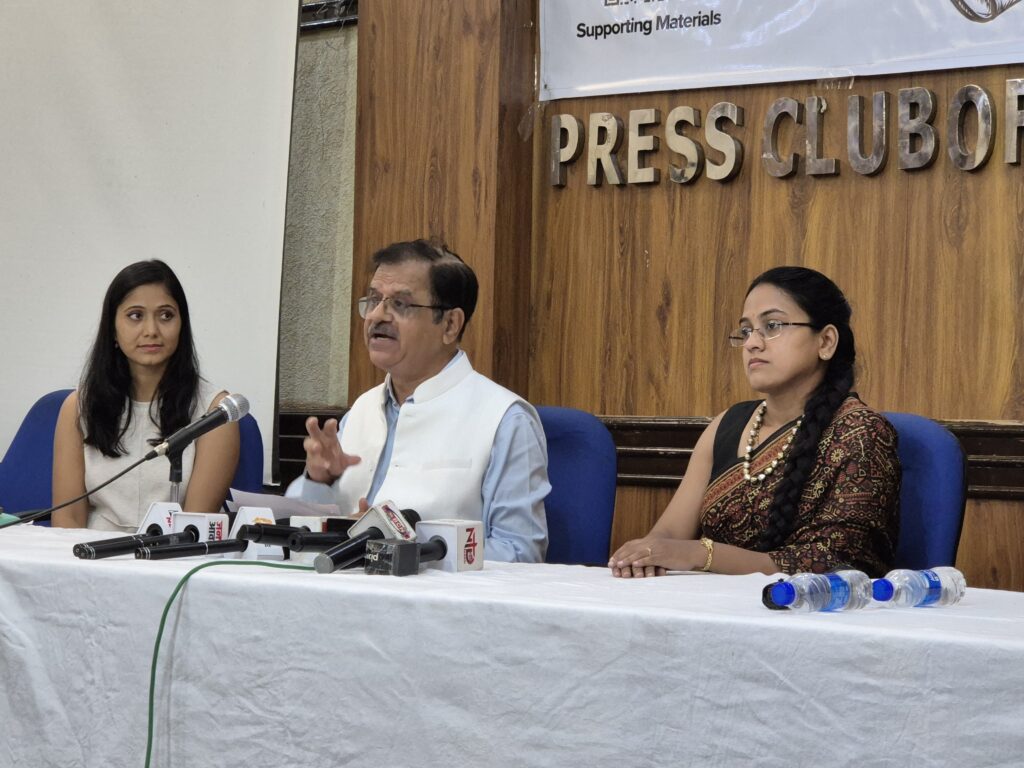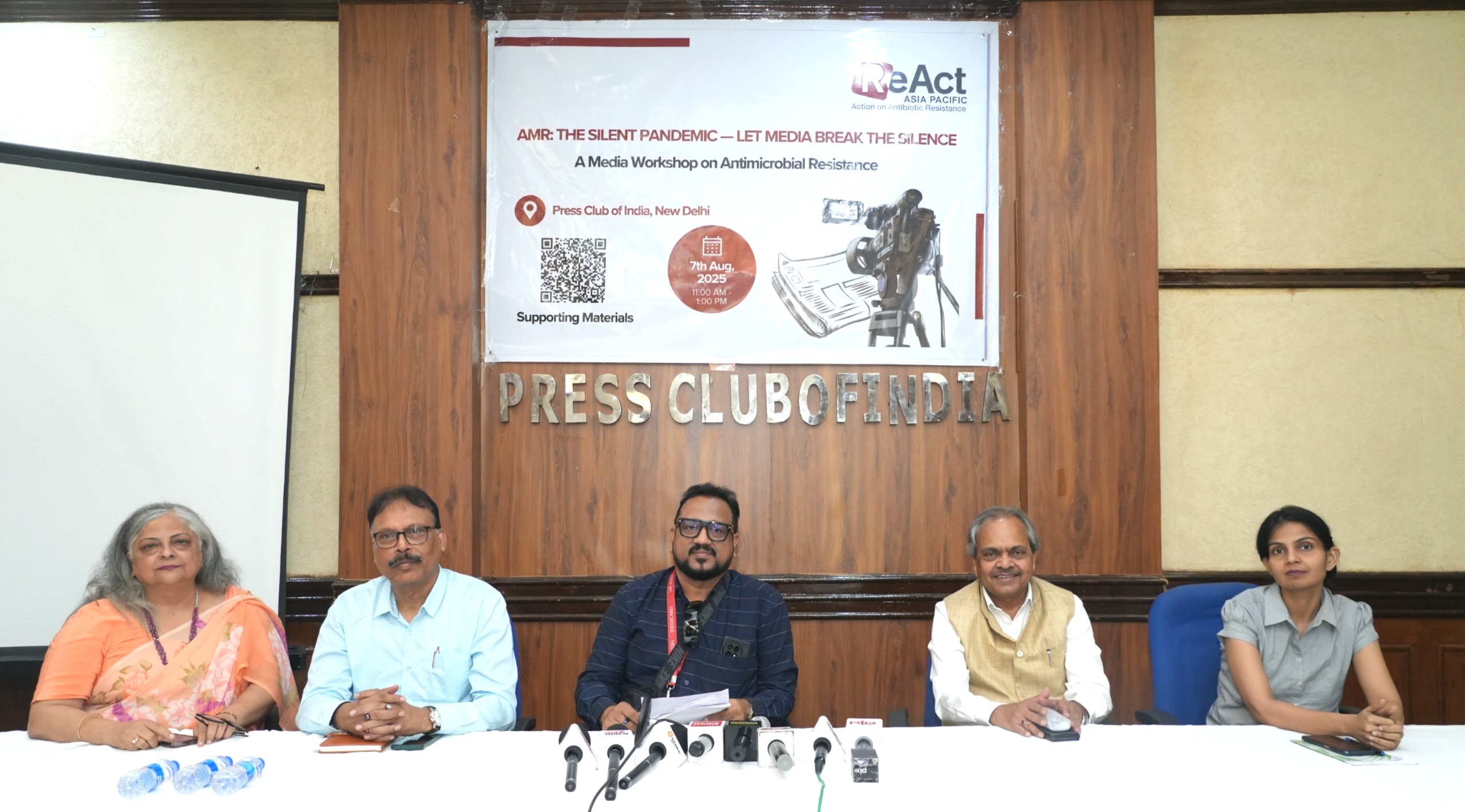Press Club of India workshop empowers media with One Health strategies and scientific insights to spotlight the global AMR crisis.
New Delhi, August 7, 2025 – A high-level media workshop titled “AMR: The Silent Pandemic – Let Media Break the Silence” was convened today at the Press Club of India, bringing together journalists, medical experts, and civil society leaders. Hosted by ReAct Asia Pacific, the event sought to raise media literacy and public understanding about the growing and largely underreported threat of Antimicrobial Resistance (AMR).
A Global Crisis That Demands Immediate Attention
Antimicrobial Resistance has emerged as one of the most alarming health emergencies globally. In 2021, bacterial AMR was linked to approximately 4.71 million deaths, with 1.14 million directly caused by resistant infections. Projections indicate that if left unchecked, AMR could result in 39 million deaths by 2050 — translating to one death every 20 seconds.
Workshop Arms Media with Cross-Sectoral Tools and Knowledge
This one-day workshop was designed to give journalists scientific insight and practical tools to report on AMR from a ‘One Health’ perspective, which considers the interdependence of human, animal, and environmental health.
Dr. S.S. Lal, Director of ReAct Asia Pacific, opened the event by underlining the urgency of AMR awareness and the media’s pivotal role in informing the public and influencing policy.

Real-Life Experiences Put a Human Face on AMR
In a compelling session moderated by Dr. Narinder Saini, Chair of the IMA’s AMR Standing Committee, advocates Bhakti Chauhan and Pooja Mishra shared personal stories that highlighted the devastating effects of AMR — particularly among marginalized communities. The segment served as a powerful reminder of AMR’s real-world consequences.
Dr. Saini reinforced the message with a rallying call: “Stop Infection, Fight AMR. Act now, act together.”
One Health Approach: Collaboration Across Sectors
The One Health panel, led by Dr. Sam Prasad of AHF Indiacares, showcased how collaborative action across disciplines is key to addressing AMR. Experts like Dr. Sangeeta Sharma, Dr. Chanchal Bhattacharya, Rajeshwari Sinha, and Satish Sinha discussed how irrational drug use, food systems, and environmental practices are interconnected with the AMR crisis.
Diagnostics and Prevention at the Core of Containment
In a separate session focused on strengthening healthcare systems, Dr. Sarabjit Singh Chadha (FIND) and Dr. Tikesh Bisen (PATH) stressed the importance of accurate diagnostics and strong infection control protocols to prevent the spread of drug-resistant infections.
Building Media Capacity for Evidence-Based Reporting
Dr. Salman Khan from ReAct Africa guided participants on how to find credible scientific sources and use data effectively in AMR reporting. He was followed by Shobha Shukla from the Global AMR Media Alliance, who highlighted the challenges faced by Indian journalists in bringing AMR stories to the forefront of public discourse.
AMR Media Alliance India Chapter Launched
A significant milestone of the event was the launch of the India Chapter of the AMR Media Alliance, spearheaded by public health communicator Bobby Ramakant, who also facilitated a closing group discussion. The event concluded with a shared message: Media must lead the charge in spreading awareness and promoting responsible antibiotic use.
Key Takeaways for the Public: How to Be Part of the Solution
- Antibiotics save lives — but only when used properly.
Overuse and misuse lead to infections that no longer respond to treatment. - Not all illnesses require antibiotics.
Colds, flu, and most fevers are caused by viruses — and antibiotics do not work on viruses. - Follow prescriptions exactly.
Finish the full course, don’t skip doses, and never self-medicate. - Get tested before taking antibiotics.
Diagnostics help determine if antibiotics are needed and which ones will be effective. - Prevention is powerful.
Hygiene practices like handwashing, vaccination, and clean sanitation reduce infections and the need for antibiotics. - AMR impacts all of us — not just those in hospitals.
Resistant bacteria can spread through food, water, animals, and the environment. - Ask the right questions.
It’s your right to ask your doctor: “Do I really need this antibiotic?” - Protect antibiotics for future generations.
These drugs are a shared global resource — use them wisely.




